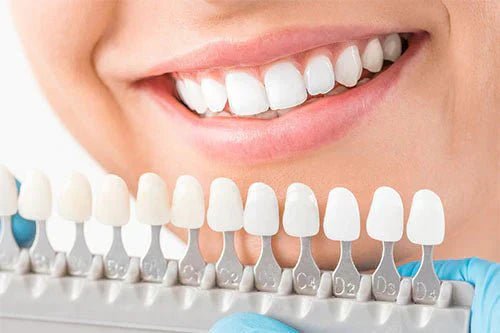Culver City Dentist FAQs: Can Veneers Replace Missing Teeth?
As seasoned dentists in Culver City, we’ve had patients with missing teeth who often ask us this: Can I get veneers if I have missing teeth?
We wish we could always say, “Yes, we can replace your missing teeth with veneers,” but unfortunately, it isn’t the most suitable option.
Dental veneers can’t replace missing teeth because they need a natural tooth structure to attach to. If you have a missing tooth, you will need a different solution, such as a dental implant or a denture. Veneers can only cover imperfections such as chips, cracks, stains, gaps, or crookedness.
This article will further explain why veneers can’t cover missing teeth. Ultimately, we’ll provide the best options for restoring your smile. We will also compare each option's costs, benefits, and drawbacks so you can make an informed decision.
But before diving into this topic, it’s just as important to know why a missing tooth or gaps should be left untreated.

Reasons to Replace Missing Teeth
Based on current epidemiological research, approximately 178 million Americans have one missing tooth, while around 40 million have lost all their teeth. The prevalence of this issue increases with age, as 30% of individuals aged 65-74 years have no natural teeth.
In India, for instance, a study suggests that tooth loss remains a significant healthcare challenge and is often overlooked. The decline in tooth health in advanced age is linked to diminished self-rated health (SRH) among older individuals and reduced psychological and subjective well-being.
These studies only imply that tooth loss is a common and serious problem. Not only does tooth loss impact your oral health, but also your overall quality of life. Some of the possible effects of having missing teeth include:
- Poor diet, resulting in weight loss or obesity, increasing the risk of chronic diseases
- Bone resorption, causing the shrinkage of the jawbone and loss of bone density, impacting facial appearance, dental implant options, and denture fit
- Tooth misalignment may occur as neighboring and opposing teeth shift into the space,
- Changes in chewing function, bite stability, and dental aesthetics
- Jaw pain, stiffness, clicking, and headaches
- Negative impact on cognitive function, increasing the risk of dementia as missing teeth impair sensory input and brain activity
- Low self-esteem, leading to limited social interaction
With these negative consequences comes the necessity to address missing teeth early on and visit your dentist. Some of the treatments your restorative dentist might recommend for replacing missing teeth include:
- Dental implants
- Dental bridges
- Removable partial or complete dentures
Why Veneers are a Big No-go for Missing Teeth
Like a silicone sealant is useless for a dilapidated and crumbling metal roof, dental veneers are ineffective for missing teeth. Here’s why.
Dentists recommend veneers for cosmetic and restorative purposes, not entirely for tooth replacements. Veneer materials such as composite, porcelain, or ceramic are typically designed to bond to the front surface of existing teeth but not to replace an entire tooth structure. Placing them over a gap where a tooth is missing lacks a strong structure or foundational support to maintain stability and functionality.
Also, a complete set of teeth aren’t just for a radiant smile; they play a crucial role in biting, chewing, and maintaining the structural integrity of the jaw. While veneers can give you those pearly whites, they lack the durability to support biting and chewing functions.

Dental Implants: The Best Solution for Missing Teeth
We’ve established, thus far, that veneers won’t help cover gaps and replace missing teeth. But it doesn’t mean all hope is lost for those seeking conservative teeth replacement procedures. That brings us to the golden standard in all tooth replacement options—dental implants.
Dental Implants
Dental implants are tooth-like prosthetics designed to fill gaps or spaces resulting from common post-extraction procedures. Their distinctive feature lies in the artificial screw-like tooth roots surgically implanted into the jawbone, establishing a robust foundation that restores a person's natural chewing function.
Dental implants are best for replacing missing teeth due to their natural feel, appearance, and durability. With a titanium root surgically implanted into the jawbone, they closely mimic natural teeth, providing a stable foundation.
Not only do they last for many years (10-30 years), but they also contribute to jawbone preservation, preventing bone loss. Dental implants offer a secure fit without impacting adjacent teeth, ensuring comfort in daily activities.
Implants have different types:
- Endosteal
- Subperiosteal
- Zygomatic
You can read this comprehensive guide to learn more about these dental implant types.
Another option to consider is All-on-4 Dental Implants, which works well for people who have lost all their teeth due to natural causes or issues like severe gum disease, decay, or broken teeth.
The procedure is named "all-on-4 implants" because it strategically places four dental implants in the jawbone to create a strong foundation for a complete set of prosthetic teeth. This approach is especially beneficial for those seeking a comprehensive solution to tooth loss.
While dental implants offer significant benefits, it's essential to be aware of potential drawbacks. One notable disadvantage is the cost, as implants are more expensive than alternative tooth replacement options. The process also requires surgery, which might not be suitable for everyone, and there's a healing period involved.
According to Delta Dental’s Cost Estimator, the out-of-network cost of a single implant or tooth replacement in Culver City can range from $4,528 - $6,800. However, some factors come into play when determining the cost of dental implants, and that’s what we’ve explained in this article.
Despite these considerations, many find implants' long-term benefits and natural feel outweigh the drawbacks. Still, weighing the pros and cons is crucial based on individual circumstances and preferences. That’s why it’s essential to consult your dentist regarding this matter.
If costs and invasiveness can become a significant roadblock to your dental restoration journey, you can always consider the following alternatives.
Dentures
If you’re looking for a conservative and affordable option to fill in those gaps in your gums, you can go for removable dentures.
Having false teeth is a cheaper alternative to getting dental implants. Removable or partial dentures can cost anywhere from $300 to $8,000. The price depends on material quality, the number and location of teeth, and the type of denture you acquire. There are downsides to wearing dentures, though. Wearing dentures for missing teeth may feel uncomfortable, cause difficulty in speech, and reduce biting efficiency, impacting overall oral function and daily comfort.
Although they may appear less reliable and aesthetically pleasing than their pricier counterparts, dentures are still a reliable dental restoration option.
Dental Bridges
Dental bridges, on the other hand, are like dentures anchored with your natural teeth or in an implant with the primary function of closing the gap between teeth due to tooth loss. It has three main components:
- Abutment - the bridge's foundation, securely attached to adjacent teeth in a dental bridge made of porcelain.
- Crown - positioned atop the abutment, it secures and supports the pontic
- Pontic – the false teeth. It can be made of different materials such as metals (e.g., gold, platinum, palladium, silver), porcelain, resin, or a combination of metal and resin.
Unlike dentures, bridges provide a stable, fixed solution that feels like natural teeth while maintaining your facial structure. Although it’s more expensive than dentures, bridges are cheaper than dental implants.
In terms of their disadvantages, dental bridges involve placing crowns over healthy teeth, shaving down, and capping adjacent healthy teeth, which poses a potential risk of permanent damage by compromising tooth enamel. Unlike implants, bridges cannot address jawbone loss since they lack roots and may not last a lifetime due to potential damage to anchor teeth.
Got More Questions? Contact United Dental Care
To determine the most suitable treatment, consult our dentist at United Dental Care for a thorough examination and personalized recommendations. Take the next step in achieving a confident smile by booking an appointment online through our website. You can also call us at (310) 390-6000. Our dental office is conveniently located at 3909 Sepulveda Blvd, Culver City, California.




 By:
By: 

